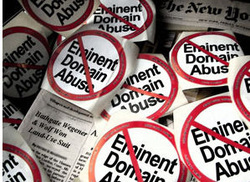
Eminent Domain Abuse – What’s Yours is Yours … Maybe
“Give me your house! I want to build a whorehouse that will pay more taxes to the town than you do. My friend, the mayor, says if you don’t sell it to me cheap, he’ll just condemn it and take it!” said the wealthy, well-connected developer.
If you haven’t heard about the “Eminent Domain” controversy of the last few years … you must have been living under a rock. One of the most basic tenets of “Americanism”, the sanctity of private property ownership has been deemed subservient to the almighty dollar. Even our Supreme Court, (That’s the US Supreme Court), has sided with the thieves that will use the law to take your property for “the greater good” of the whole. That means your private property, bought and paid for, is only yours as long as your town or municipality doesn’t decide they can make better use of it... Read more >>>
“Give me your house! I want to build a whorehouse that will pay more taxes to the town than you do. My friend, the mayor, says if you don’t sell it to me cheap, he’ll just condemn it and take it!” said the wealthy, well-connected developer.
If you haven’t heard about the “Eminent Domain” controversy of the last few years … you must have been living under a rock. One of the most basic tenets of “Americanism”, the sanctity of private property ownership has been deemed subservient to the almighty dollar. Even our Supreme Court, (That’s the US Supreme Court), has sided with the thieves that will use the law to take your property for “the greater good” of the whole. That means your private property, bought and paid for, is only yours as long as your town or municipality doesn’t decide they can make better use of it... Read more >>>
What is Eminent Domain
The concept of Eminent Domain is that sometimes, for the good of the public as a whole, the state, (city or town, or municipality), has the right to take private property, within its jurisdiction, and use it for the good of the whole community. This isn’t necessarily as bad as it sounds, as the original intent envisioned its use for things like; public schools, roads right-of-ways, and public works projects. It’s a bitter pill to swallow, but sometimes it must be admitted that it is illogical for one obstinate property owner to be able to forestall a project like a road, bridge, or school that would be a major benefit to the citizens of the community.
Eminent Domain and The Constitution
The Law of Eminent Domain is not a specific part of The Constitution, other than being considered to be included in the “inherent powers” of government. But the concept is specifically addressed, at least twice in The Constitution. The fifth amendment includes this wording regarding the state’s taking of private property; “nor shall private property be taken for public use, without just compensation”. And again in the fourteenth amendment which asserted, “the contention that the due process clause of the Fourteenth Amendment afforded property owners the same measure of protection against the States as the Fifth Amendment did against the Federal Government”.
The concept of Eminent Domain is that sometimes, for the good of the public as a whole, the state, (city or town, or municipality), has the right to take private property, within its jurisdiction, and use it for the good of the whole community. This isn’t necessarily as bad as it sounds, as the original intent envisioned its use for things like; public schools, roads right-of-ways, and public works projects. It’s a bitter pill to swallow, but sometimes it must be admitted that it is illogical for one obstinate property owner to be able to forestall a project like a road, bridge, or school that would be a major benefit to the citizens of the community.
Eminent Domain and The Constitution
The Law of Eminent Domain is not a specific part of The Constitution, other than being considered to be included in the “inherent powers” of government. But the concept is specifically addressed, at least twice in The Constitution. The fifth amendment includes this wording regarding the state’s taking of private property; “nor shall private property be taken for public use, without just compensation”. And again in the fourteenth amendment which asserted, “the contention that the due process clause of the Fourteenth Amendment afforded property owners the same measure of protection against the States as the Fifth Amendment did against the Federal Government”.
| | But that’s where a private citizen’s right to private property ends, because it was left up to the governing authority to declare their definition of “public good”, and the judiciary to validate their definition. That left the door open to defining “public good” as including almost anything that would benefit the community, like: more tax revenue, or projects that would draw commerce to the community, or even projects that would just beautify the community, rather than just the obvious definition of public schools and such. |
Now, Eminent Domain is not a new controversy, it has been fought, debated, and defined in our court systems since as early as 1876: “in 1876, its existence was recognized by the Supreme Court. In Kohl v. United States any doubts were laid to rest, as the Court affirmed that the power was as necessary to the existence of the National Government as it was to the existence of any State.”
Got it? That was the original intent of Eminent Domain. School’s out.
Ok, Ok, I get it. There are times when the good of the whole supersedes the rights of the individual. I don’t have to like it in order to admit its logic. But you better damn sight play by the rules and prove the need if you are going to take someone’s property when they don’t want to part with it!
Isn’t there a quote that says something about – “the best laid plans of mice and men …” or something like that? Here’s where that foundation of understanding has been taken us.
Now a governing authority can decide that anything they decide is good for the community can justify the use of Eminent Domain, (sometimes, even if that good is money in their pockets)! So if Joe Blow’s house pays $100 in property taxes to the town, and developer John Smith wants to build a condo on Joe Blow’s property that will pay $1000 in property taxes, fine, that’s a public good, we’ll just take Joe’s property away from him and give it to John the developer. But what about Joe’s constitutional rights of private property ownership, and the protection of those rights? Too bad … So sad … It’s for the public good – don’t you know.
What? You don’t believe that something like that could happen? It has, and it continues to happen. In 2005 the US Supreme Court upheld an Eminent Domain ruling that involved the taking of private property for economic improvement, check out the case of Kelo v. City of New London. Or how about what the State’s courts are doing in the case of the Empire State Development Corporation’s right to condemn privately owned homes in order to give the property to a developer for a redevelopment project. And if you really want to feel your blood boil, check out what happened after that landmark Kelo Supreme Court case. Here’s the gist of it: the city of New London, Conn., wanted to lure Pfizer Pharmaceuticals, (and all its money and jobs) to relocate to their town. They offered, (and did), to condemn whatever property would be needed for the project, and they offered an 80% tax cut to the corporation for 10 years! Of course the private property owners fought the deal, all the way to the Supreme Court, and lost! Pfizer got the land. But! They didn’t complete the project! They only built a building for their corporate offices. And now, four years later, not only did the rest of the project not get completed, but they are closing that one office building and moving their operations to Groton Conn.!
All you have to do is do a Google search for, “Eminent Domain Abuses” and you will see examples that are so outrageous you will be checking to make sure you are still in the USA. If you don’t see a major problem here, then using my favorite term, “you’re an idiot!.” But if you do see the craziness of this, then perhaps you would be interested in some follow-up information. The Institute for Justice might be a good place to start. Self-described as “our nation's only libertarian public interest law firm”, they have a special division of operations that deals with individual property rights cases called the Castle Coalition. If you are interested in this governmental abuse at all you should check out these two sites.

 RSS Feed
RSS Feed